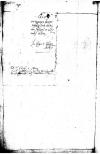Misimus Tuae
S(trenuita)ti or S(incerita)ti⌈S(trenuita)tiS(trenuita)ti or S(incerita)ti⌉
cum nostris prioribus sub
data die XV Aprilis litteras a serenissimo ⌊Bohemiae rege⌋ obtentas in commendationem ⌊ducatus nostri Barensis⌋, ut a contributione adohae ms. adhoae(!)
⌈adohaeadohae ms. adhoae(!)
⌉ sit liber et immunis, quae si prodesse poterint, bene est, sin minus, ferendum est, quoad ferre licuerit et fata permiserint. Nolumus tamen Tuam
S(trenui)tem or S(incerita)tem⌈S(trenui)temS(trenui)tem or S(incerita)tem⌉
ignorare, quod pendente dubietate, an nos adoham solvere teneremur,
ill(ustrissimu)s or ill(ustri)()s⌈ill(ustrissimu)sill(ustrissimu)s or ill(ustri)()s⌉
prorex adoham ms. adhoam(!)
⌈adohamadoham ms. adhoam(!)
⌉ indixit generalem et commissarii ab eo electi nostros officiales ad solutionem adohae constrinxerunt nullo iurium nostrorum habito respectu. Et quia in ⌊Italia⌋ bella ubique incrudescunt et et de regni Neapolitani invasione timetur vehementer, minus grave nobis visum est, quod pro hoc tempore turbulentissimo ad solutionem adohae coactae fuerimus, sed in posterum doleremus, si nos ab huiusmodi contributione sicuti praedecessores nostri fuere, exemptae et immunes non essemus, tot et tantis rationibus pro nobis militantibus, quas alias Tuae
S(trenuita)ti or S(incerita)ti⌈S(trenuita)tiS(trenuita)ti or S(incerita)ti⌉
perscripsimus. Quamobrem
S(trenuita)tem or S(incerita)tem⌈S(trenuita)temS(trenuita)tem or S(incerita)tem⌉
Tuam hortamur, velit suo congruo tempore cum sacra ⌊maiestate caesarea⌋ de hac nobis illata iniuria conqueri et ab eadem maiestate obtinere, ut deinceps et in perpetuum nos a solutione huiusmodi adohae liberemur. Nolumus iure nos contendere, sed hanc exemptionem ex caesarea munificentia et singulari gratia obtinere, prout speramus, Tuam
S(trenuita)tem or S(incerita)tem⌈S(trenuita)temS(trenuita)tem or S(incerita)tem⌉
quam diligentissime facturam.
De restitutione ⌊arcis⌋ saepius Tuae
S(trenuita)ti or S(incerita)ti⌈S(trenuita)tiS(trenuita)ti or S(incerita)ti⌉
scripsimus, ut nobis libere et sine condicione extraderetur, s written over n⌈nss written over n⌉ed veremur, ne stantibus his bellorum turbinibus difficilis sit ad praesens ipsius arcis restitutio. Tua autem
S(trenui)tas or S(inceri)tas⌈S(trenui)tasS(trenui)tas or S(inceri)tas⌉
, prout rerum eventus illam in dies edocuerit, poterit hanc expeditionem perficere, qua nil optabilius nilque gratius contingere posset. Nam ni ⌊arx⌋ ipsa recuperetur, ⌊statum Barensem⌋ recuperatum non credimus. Multa oboriuntur scandala hoc praesertim tempore, quae si ⌊arx⌋ restituta foret, non oborirentur. Studeat igitur S(trenui)tas or S(inceri)tas⌈S(trenui)tasS(trenui)tas or S(inceri)tas⌉ Tua, ut huic nostro desiderio satis fiat.
In negotio magnifici ⌊Ludouici Aliphii⌋ hoc, quod totiens scripsimus, iterum repetimus et diligentissime committimus, expediat ei quam primum litteras caesareas Tua S(trenui)tas or S(inceri)tas⌈S(trenui)tasS(trenui)tas or S(inceri)tas⌉ et huc mittat cumprimis secundum informationem, quam ipse dederat.
Et bene valeat.

 BCz, 262, p. 390
BCz, 262, p. 390